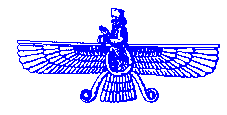http://www.avesta.org/zfaq.html
overview
Zoroastrianism is a religion founded in ancient times by the prophet Zarathushtra, known to the Greeks as Zoroaster.
Zoroastrianism was the dominant world religion during the Persian empires (559 BC to 651 AC), and was thus the most powerful world religion at the time of Jesus. It had a major influence on other religions. It is still practiced world-wide, especially in Iran and India.
To quote Mary Boyce,
"The prophet Zarathushtra, son of Pourushaspa, of the Spitaman family, is known to us primarily from the Gathas, seventeen great hymns which he composed and which have been faithfully preserved by his community. These are not works of instruction, but inspired, passionate utterances, many of them addressed directly to God; and their poetic form is a very ancient one, which has been traced back (through Norse parallels) to Indo-European times. It seems to have been linked with a mantic tradition, that is, to have been cultivated by priestly seers who sought to express in lofty words their personal apprehension of the divine; and it is marked by subtleties of allusion, and great richness and complexity of style. Such poetry can only have been fully understood by the learned; and since Zoroaster believed that he had been entrusted by God with a message for all mankind, he must also have preached again and again in plain words to ordinary people. His teachings were handed down orally in his community from generation to generation, and were at last committed to writing under the Sasanians, rulers of the third Iranian empire. The language then spoken was Middle Persian, also called Pahlavi; and the Pahlavi books provide invaluable keys for interpreting the magnificent obscurities of the Gathas themselves." - Zoroastrians, Their religious beliefs and practices, London, 1979, pg 17.
Some of the major tenets of Zoroastrianism include:
God: Ahura Mazda
The supreme being is called Ahura Mazda (Phl. Ohrmazd), meaning "Wise Lord." Ahura Mazda is all good, and created the world and all good things, including people. He is opposed by Anghra Mainyu (Phl. Ahriman), meaning "Destructive Spirit," the embodiment of evil and creator of all evil things. The cosmic battle between good and evil will ultimately lead to the destruction of all evil.
Prophet: Zarathushtra
The religion was founded by Zarathushtra. His date is uncertain, but is probably somewhere around 1200 BC. He lived and preached in the Inner Asian steppes. Zarathushtra received his revelations directly from Ahura Mazda, and from his Archangels (Amesha Spentas).
Scripture: Avesta
The central scripture is the Avesta. The most sacred sections of the Avesta are the Gathas or Hymns of Zarathushtra; they are also the most enigmatic. Later sacred literature includes the Pahlavi Texts, which contain extensive quotations and paraphrases from lost Avesta texts.
Creed
The creed is summarized in Yasna 12. It is likely to have been composed by Zarathushtra himself, and to have been used as an avowal of faith by early converts (Cf. Boyce, Zoroastrianism, Its Antiquity and Constant Vigour, p. 102-4).
Observances
Two sacred garments, the sudreh (shirt) and kusti (cord) are the emblems of the religion. Zoroastrians perform a short cleansing ritual (Padyab), and retie the kusti several times a day with another short ritual (Nirang-i Kusti) as a sign of their faith. Other prayers are recited daily from the Khorda Avesta. Prayer is largely done in the Avestan language. The faithful should also participate in seasonal communal festivals ("Gahambars") during the year.
Fire and "Asha"
Fire, as a symbol of "Asha" and the "original light of God," holds a special place of esteem in the religion. Prayer is often done in front of a fire, and consecrated fires are kept perpetually burning in the major temples.

